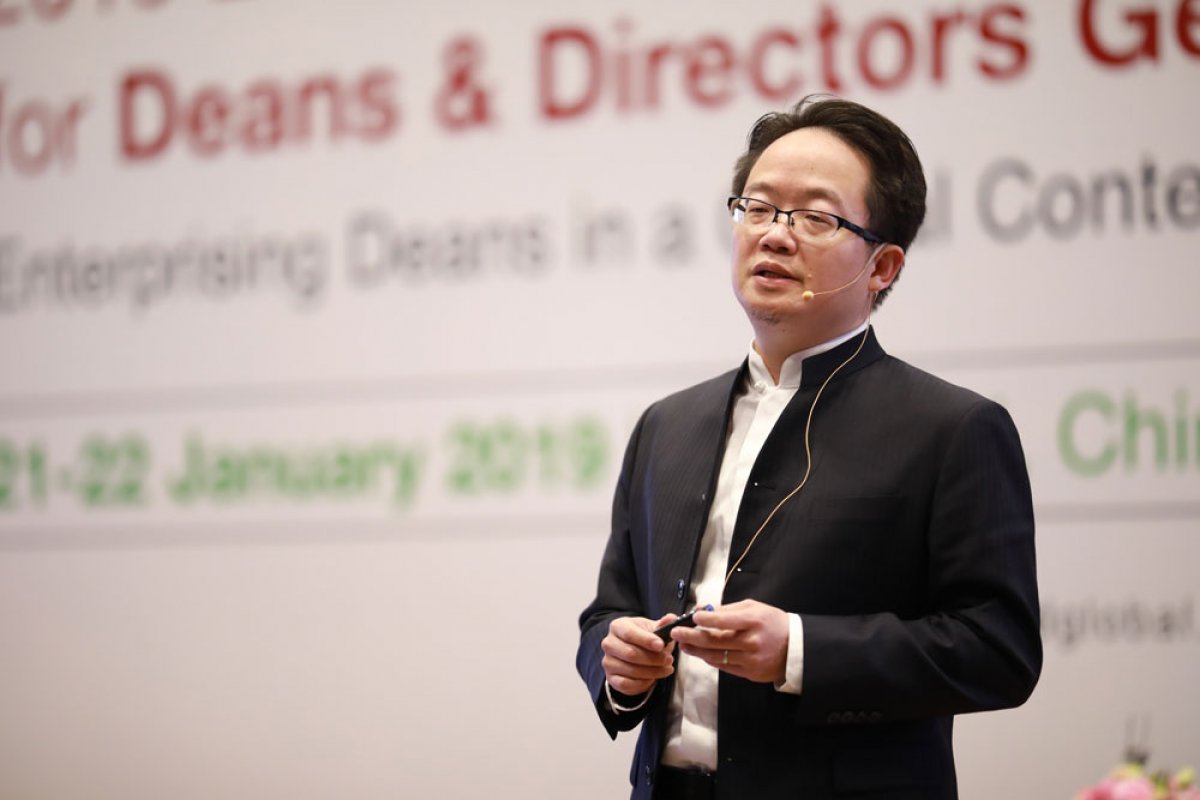Cainiao’s Chen Weiru: Bridge between Academia and Business World
January 22, 2018. Shanghai — After 15 years in the classrooms of world class business schools such as CEIBS and INSEAD, Chen Weiru had a career switch. He is now working as Chief Strategy Officer at Alibaba’s logistics arm, Cainiao Network. Today, as the penultimate speaker at the 2019 EFMD Conference for Deans & Directors General, he shared some of the lessons he has learned along the way and his thoughts on how the digital world will impact business schools.
Lured away from academia by the opportunity to leverage digitalisation to both “guide and learn from an internet company”, Chen’s role at Cainiao is a combination of research, coaching and training and being the bridge between the company and its stakeholders. As he puts it, his job is to envision the future smart logistics network; enable strategic thinking within the top management team; redesign governance mechanisms with ecosystem partners; and ‘preach’ the future digital intelligent world.
Cainiao provides a technology driven platform through which it helps logistics companies do a better job of meeting their customers’ needs. That’s a mammoth task in China which has twice the number of parcel deliveries per day as the United States and thousands of small players in the logistics industry. The company’s goals, set by Alibaba’s inimitable Founder Jack Ma, include ensuring that every parcel delivered within China gets to its final destination within 24 hours. Before Cainiao, the average was six days and now the industry standard is about two days. Another goal is to have three-day delivery worldwide, down from almost 15 days. “Jack Ma set very simple KPIs, but they take more than ten years to accomplish,” Chen told his audience wryly.
So far, Cainiao’s innovations in labelling have helped cut delivery time and made the entire logistics chain more efficient. It now works with more than 3,000 logistics partners (3 million personnel), delivering 107 million packages a day to more than 200 countries. But what of the lessons Chen has learned?
He now has greater insight into how hard it is to be a start-up and greater appreciation for the blue-collar workers on the front lines of the logistics industry. And he sees the value of having knowledge across a wide spectrum of disciplines. “I know strategy, but for example I also need IT and OBHR, and as academics (who typically pick a specific area of expertise) we don't have enough exposure to this breadth of knowledge. I am forced to think about deep things, and it makes me think I didn't study hard enough when I was doing my PhD,” he added with a laugh. Another takeaway from his time in the business world: idealism needs to be balanced with reality, and vice versa. As faculty, he noted, the traditional approach is to provide the theory and leave it to the students to implement. “Now I have come to realise that we need to think from both sides and we need to do more,” he said.
He also spoke of a radical shift in his mind-set, telling the audience of decision makers from global business schools that he has moved away from the “seeing is believing approach”. He explained that now his first step is believing in even bigger things, with a much longer horizon. “Now I have found the power of belief, of imagination and with that I can actually see,” he said.
And what does all this mean for business schools? Chen believes there needs to be new formats and processes of business education, new subjects and disciplines, new theories and paradigms along with new ways of knowledge creation — and a new mind-set. “We need real time cases and we need to teach students what’s happening right now,” he said. The good news is that CEIBS last year launched its patented Real Situation Learning Method, a major step in the right direction!













